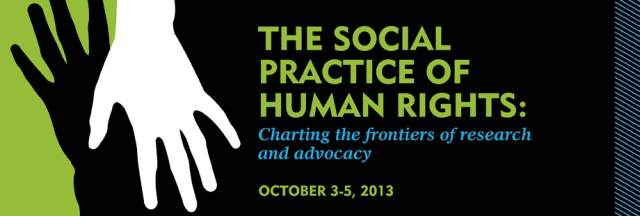Location
River Campus, Room M2006
Start Date
10-4-2013 1:00 PM
Abstract
The human right to water gained recognition in the 2000’s and grew up in the context of resistance to the privatization of urban water utilities. Dozens of countries and municipalities have seen controversy over water utility privatization since 1990. In most, human rights advocates worked alongside trade unions, consumer organizations, development NGOs and others, employing a range of advocacy strategies at local, national and international levels. This paper poses two questions: what do human rights and other strategies contribute to the effort?; and what are the roles of human rights advocates, after the issue of privatization has been settled?
It focuses on the post-privatization experience in Accra, Ghana; South Africa (several cities); Cochabamba, Bolivia; Manila, Philippines; and Buenos Aires, Argentina; and studies of experiences in France and Ukraine.
The first question seeks to clarify how human rights and development strategies interact. By identifying how civil society organizations employ their principal strategies (protest against privatization, pressure to make public utilities more effective, and initiatives to create independent supply systems) and how they interact, the paper sheds light on the impact of human rights on water policy advocacy.
Even successful resistance to privatization leaves communities with utilities that generally serve low-income populations poorly. This raises our second question: how do advocates address the systems (public or privately-managed) that emerge? Do the social movement organizations and consumer associations that resisted privatization also press the public utility for better service? Has pressure on public utilities been sustained and effective?
The Human Right to Water and Advocacy for Urban Water Supply: After the Privatization Struggles
River Campus, Room M2006
The human right to water gained recognition in the 2000’s and grew up in the context of resistance to the privatization of urban water utilities. Dozens of countries and municipalities have seen controversy over water utility privatization since 1990. In most, human rights advocates worked alongside trade unions, consumer organizations, development NGOs and others, employing a range of advocacy strategies at local, national and international levels. This paper poses two questions: what do human rights and other strategies contribute to the effort?; and what are the roles of human rights advocates, after the issue of privatization has been settled?
It focuses on the post-privatization experience in Accra, Ghana; South Africa (several cities); Cochabamba, Bolivia; Manila, Philippines; and Buenos Aires, Argentina; and studies of experiences in France and Ukraine.
The first question seeks to clarify how human rights and development strategies interact. By identifying how civil society organizations employ their principal strategies (protest against privatization, pressure to make public utilities more effective, and initiatives to create independent supply systems) and how they interact, the paper sheds light on the impact of human rights on water policy advocacy.
Even successful resistance to privatization leaves communities with utilities that generally serve low-income populations poorly. This raises our second question: how do advocates address the systems (public or privately-managed) that emerge? Do the social movement organizations and consumer associations that resisted privatization also press the public utility for better service? Has pressure on public utilities been sustained and effective?




Comments
This biennial conference provides a unique space for scholars, practitioners and advocates to engage in collaboration, dialogue and critical analysis of human rights advocacy — locally and globally. Learn more about the Human Rights Center at the University of Dayton >>>.